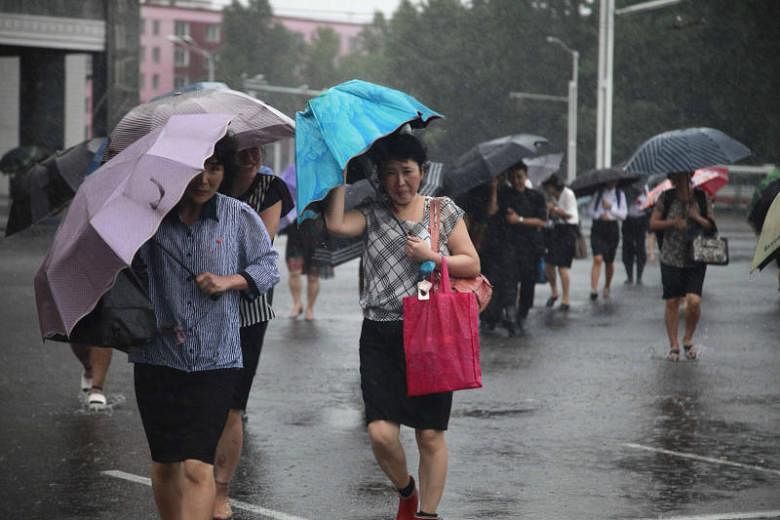SEOUL - A powerful typhoon that swept through the Korean Peninsula over the weekend destroyed 46,200 hectares of farmland in North Korea, raising concerns that the sanctions-squeezed country could face even more severe food shortages.
The state-owned Korea Central News Agency (KCNA) said on Sunday (Sept 8) the storm left five people dead and injured three others.
Typhoon Lingling, bringing winds of up to 196 km per hour, hit the southern coast of South Korea on Saturday morning before moving northwards.
In South Korea, it killed three people and injured 13 others, and left more than 161,000 homes without power.
Hundreds of flights were also cancelled, as the fifth-strongest winds ever recorded on the peninsula damaged about 3,600 properties and toppled hundreds of trees.
In North Korea, crops fell, were inundated, or buried in 46,200 hectares of farmland, KCNA said, adding that 460 houses and 15 public buildings were also destroyed or damaged.
"Active work to eradicate the aftermath is now under way in the afflicted areas."
Neighbouring Japan, meanwhile, was bracing for a separate storm that could bring "historic" winds and rain, said its meteorological agency.
Typhoon Faxai, packing winds of up to 216 kmph, was expected to hit coastal areas near Tokyo late Sunday to Monday morning.
Authorities warned of flooding, landslides, and up to 400mm of rainfall. Some 30 flights were to be grounded, and about 50 bullet trains cancelled.
While the advanced economies of Japan and South Korea are well-equipped to deal with the aftermath of the typhoon, it is feared that North Korea will struggle with restoration and rehabilitation works.
In a meeting last Friday to discuss urgent emergency measures, North Korean leader Kim Jong Un berated government officials for their "easy-going" attitude towards the storm.
KCNA said he described them as being "helpless against the typhoon, unaware of its seriousness".
He then called on the army to drive efforts to minimise damage, adding it would be an "enormous struggle".
KCNA said the country would focus primarily on protecting agricultural crops and preventing damage to dams and reservoirs.
Food security in North Korea is among the lowest in the world.
The United Nations had warned in May that 10.1 million North Koreans, or 40 per cent of its population, would face a "deep hunger crisis", given a food deficit of 1.36 million tonnes.
Studies by UN agencies showed that North Korea would only be able to produce 4.9 million tonnes of food - the lowest in 10 years. This is due to bad weather conditions like dry spells, heatwaves and flooding, as well as limited supply of agricultural supplies like fertiliser and fuel.
Tightened UN sanctions targeting North Korea's missile making capability have also made it hard for the country to import tools needed for farming.
The UN's World Food Programme (WFP) said North Korea received 2,188 tonnes of food aid in July. It warned that food insecurity in the North could worsen in the second half of the year and urged more international donations.
North Korea has appealed to China and Russia for food aid.
But it rejected South Korea's donation of 50,000 tonnes of rice via the WFP, apparently in a bid to protest a joint military exercise held between Seoul and Washington last month.
Dr Cheong Seong-chang of the Sejong Institute think-tank said Pyongyang may have ignored Seoul's food outreach as "they felt it is not necessary".
He told The Straits Times that the typhoon could decrease North Korea's food production, but the extent of damage remains to be seen.
"If the scale of the damage is very big, North Korea's stance towards the South's food support program might be different," he said.
Additional reporting by Dami Shin


